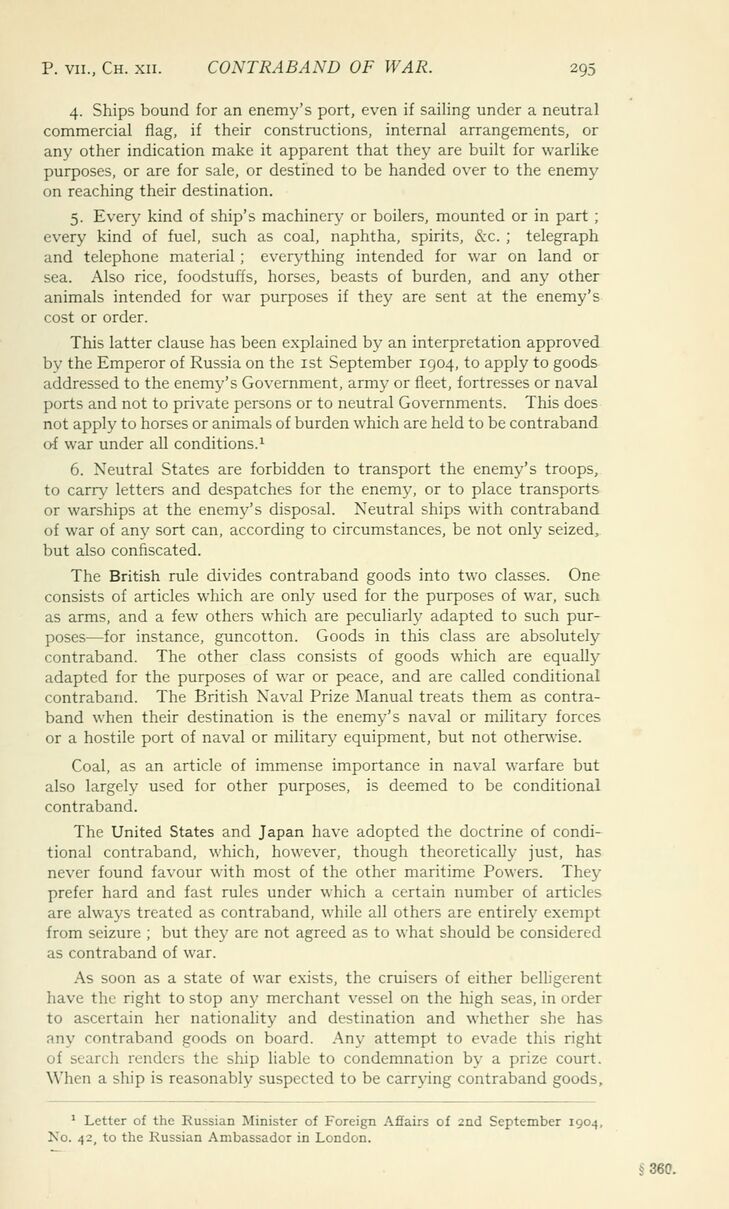
Full resolution (JPEG) - On this page / på denna sida - Pages ...

<< prev. page << föreg. sida << >> nästa sida >> next page >>
Below is the raw OCR text
from the above scanned image.
Do you see an error? Proofread the page now!
Här nedan syns maskintolkade texten från faksimilbilden ovan.
Ser du något fel? Korrekturläs sidan nu!
This page has never been proofread. / Denna sida har aldrig korrekturlästs.
P. vii., Сн. xii. CONTRABAND OF WAR.
295
4. Ships bound for an enemy’s port, even if sailing under a neutral
commercial flag, if their constructions, internal arrangements, or
any other indication make it apparent that they are built for warlike
purposes, or are for sale, or destined to be handed over to the enemy
on reaching their destination.
5. Every kind of ship’s machinery or boilers, mounted or in part ;
every kind of fuel, such as coal, naphtha, spirits, &c. ; telegraph
and telephone material; everything intended for war on land or
sea. Also rice, foodstuffs, horses, beasts of burden, and any other
animals intended for war purposes if they are sent at the enemy’s
cost or order.
This latter clause has been explained by an interpretation approved
by the Emperor of Russia on the 1st September 1904, to apply to goods
addressed to the enemy’s Government, army or fleet, fortresses or naval
ports and not to private persons or to neutral Governments. This does
not apply to horses or animals of burden which are held to be contraband
o-f war under all conditions.1
6. Neutral States are forbidden to transport the enemy’s troops,
to carry letters and despatches for the enemy, or to place transports
or warships at the enemy’s disposal. Neutral ships with contraband
of war of any sort can, according to circumstances, be not only seized,
but also confiscated.
The British rule divides contraband goods into two classes. One
consists of articles which are only used for the purposes of war, such
as arms, and a few others which are peculiarly adapted to such
purposes—for instance, guncotton. Goods in this class are absolutely
contraband. The other class consists of goods which are equally
adapted for the purposes of war or peace, and are called conditional
contraband. The British Naval Prize Manual treats them as
contraband when their destination is the enemy’s naval or military forces
or a hostile port of naval or military equipment, but not otherwise.
Coal, as an article of immense importance in naval warfare but
also largely used for other purposes, is deemed to be conditional
contraband.
The United States and Japan have adopted the doctrine of
conditional contraband, which, however, though theoretically just, has
never found favour with most of the other maritime Powers. They
prefer hard and fast rules under which a certain number of articles
are always treated as contraband, while all others are entirely exempt
from seizure ; but they are not agreed as to what should be considered
as contraband of war.
As soon as a state of war exists, the cruisers of either belligerent
have the right to stop any merchant vessel on the high seas, in order
to ascertain her nationality and destination and whether she has
any contraband goods on board. Any attempt to evade this right
of search renders the ship liable to condemnation by a prize court.
When a ship is reasonably suspected to be carrying contraband goods.
1 Letter of the Russian Minister of Foreign Affairs of 2nd September 1904,
Ко. 42, to the Russian Ambassador in London.
<< prev. page << föreg. sida << >> nästa sida >> next page >>